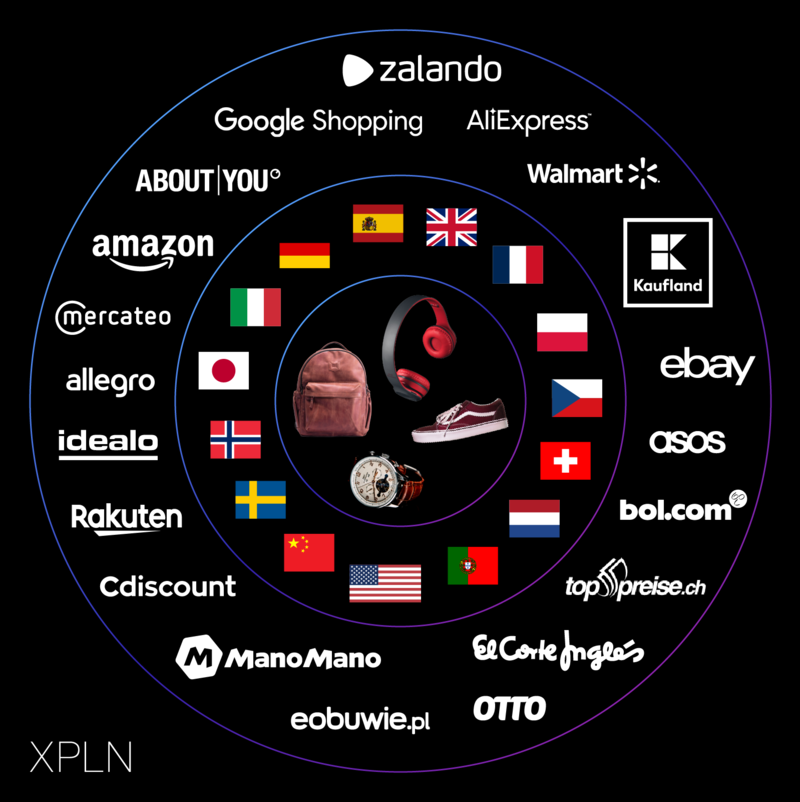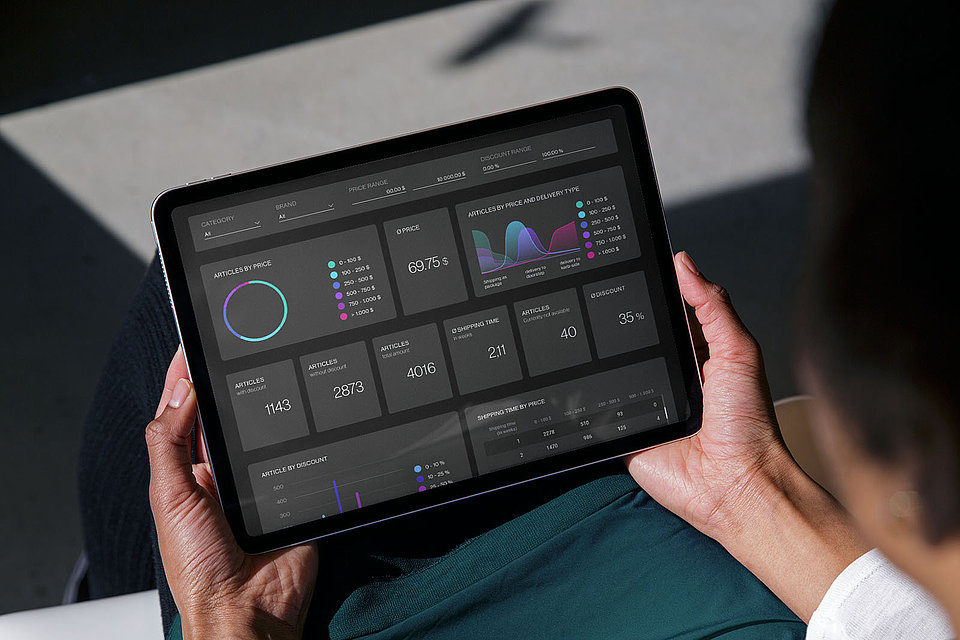How Market Intelligence Helps Brands Achieve Performance in E-Commerce
Market Intelligence in e-commerce enables confident strategic decisions about offers and positioning based on external market data.

The complexity of online retail is growing, but the challenges remain. These include navigating a myriad of marketplaces, from Amazon to Zalando, identifying relevant sales channels, dealing with increasing competitive pressure amid fluctuating consumer confidence and drastic market developments, such as supply bottlenecks. Other factors to consider include different conditions and needs in other countries.
Multichannel retailers have been navigating these turbulent waters for many years. However, many brands have only recently set sail. Since the Corona pandemic, in particular, brands have increasingly pursued a direct-to-consumer (D2C) strategy, selling directly through various sales channels. But how can you keep track in the fog and stay on course? How can available data help you make informed decisions about offers and positioning in real time?
The answer lies in Market Intelligence based on product and price data from marketplaces, price comparison sites, and competitor shops.

What Is Market Intelligence in E-Commerce
Market Intelligence enables you to observe the market and competition, generate insights and derive strategic actions. In e-commerce, it involves collecting, analysing and interpreting market information, including competitor activity and industry trends, based on product and price data from marketplaces, price comparison sites and online stores.
The focus is on external market data, whereas business intelligence primarily works with internal company data. However, the two methods of analysis are similar in their objectives: both are intended to inform strategic management decisions through the systematic collection and analysis of the market environment, enabling precise market positioning and creating a competitive advantage.
Market Intelligence in e-commerce can provide insights into new opportunities, optimisation potential and the effectiveness of marketing campaigns, enabling well-founded decisions on pricing, product development and sales.
Market Intelligence for Maximum Performance in E-Commerce
Market Intelligence offers numerous opportunities to maximise performance, especially for brands with little experience in marketplace business and D2C sales. Even experienced players can discover new potential with high-quality data.

- Market transparency: Due to its complexity, obtaining a comprehensive overview of the e-commerce market cannot be done manually. Automated collection and analysis of external market data is required to gain clarity about which retailers offer which products at which prices on which channels, and to identify emerging trends.
- Visibility: Where are products not prominent enough in rankings? By analysing external market data, brands can identify areas where action is needed to improve product visibility.
- Understanding the competition: Market data sheds light on competitors' product and pricing strategies, providing a key competitive advantage when designing and optimising your own offering.
- More sales and better margins: Price monitoring creates price transparency and helps you to determine the optimal price within your own strategy framework. Coupled with automated repricing, this can maximise sales and margins.
- Identify customer needs: Product reviews provide insight into customer satisfaction. Using semantic analysis, these can be evaluated automatically to draw valuable conclusions for marketing and product development.
- Brand protection: In e-commerce, a common problem is the loss of control over the brand. Data analysis can reveal threats to the brand and its image, such as price dumping, unauthorised retailers, grey imports, or inadequate product presentation, and enable targeted brand protection measures to be taken.
- Identify trends: Recognising product trends early on enables businesses to influence them and capitalise on them. Analysing market data provides valuable information on current developments, enabling you to stay ahead of the competition by offering suitable products.
The potential is enormous. Rather than relying on manual processes, data-driven decisions can propel the business forward, allowing resources to be allocated to strategic projects. However, a reliable partner is needed for the procurement and analysis of external market data, as there are also some pitfalls to consider.
The Challenges With Data When Using Market Intelligence
Data is a raw material. The quality of this material determines how valuable the end product will be. In order to use data in a targeted manner to advance one’s own business, a number of things must be taken into account. Firstly, internal data on the company’s own products, as well as the necessary competencies for evaluating the data, are needed to control it and draw decisive conclusions. Secondly, a reliable source must be selected for collecting, structuring and clearly preparing external market data.
The following criteria should be considered when collecting data:
- Data quality: data can be inaccurate, incomplete or inconsistent. High data quality is essential for making informed decisions.
- Data volume: Collecting and analysing large volumes of data can be overwhelming and time-consuming. If large volumes of data are needed frequently, a provider who can handle this is required.
- Data protection: The collection and use of certain types of data can raise questions in terms of data protection, which is why attention must be paid to GDPR compliance.
- Data security: The storage and protection of data can also present challenges. Using German servers, for example, provides additional confidence in the security of the data.
- Data integration: Collecting data from different sources can be difficult and integrating it can be time-consuming and require technical expertise.
With XPLN’s software solutions, however, you can overcome all these challenges. You can automate data collection with guaranteed quality, evaluate the data using our dashboards, and receive personalised support from our experts.
How Brands Can Benefit From Market Intelligence in E-Commerce
Brands in particular are currently still finding it difficult to gain a comprehensive market overview. There are so many questions looking for answers:
- Where are my products being sold?
- Who is selling my products?
- What prices and discounts are my products sold at?
- How stable are the prices?
- How do prices change during sales periods?
- Are there minimum price underruns?
- Are all products published and available to customers?
- Which competitors have comparable offers?
- How do my offers compare to those of my competitors?
- Are my exclusive assortments truly exclusive?
- Which of my channels is the strongest (compared to the competition)?
- What are the differences between the various sales channels?
- Where is there still potential?
This information is available, but the external data must first be captured and analysed. Problems can quickly impact brand perception and profitability.
Combining this with internal data and KPIs provides a comprehensive picture of the market and current developments. If this data is used in a targeted manner, strategies can be developed and data-driven decisions can be made.
We already support many well-known brands, such as Gardena, Tommy Hilfiger and Severin, as well as retailers, including Euronics, Zoologo and Aponeo in making informed decisions about their offerings and positioning in e-commerce. We would be happy to advise you on how you can also use Market Intelligence to its full potential in e-commerce.

Sounds interesting?
Get to know our solutions for market intelligence. We would be happy to discuss your individual use case in a free and non-binding consultation.
